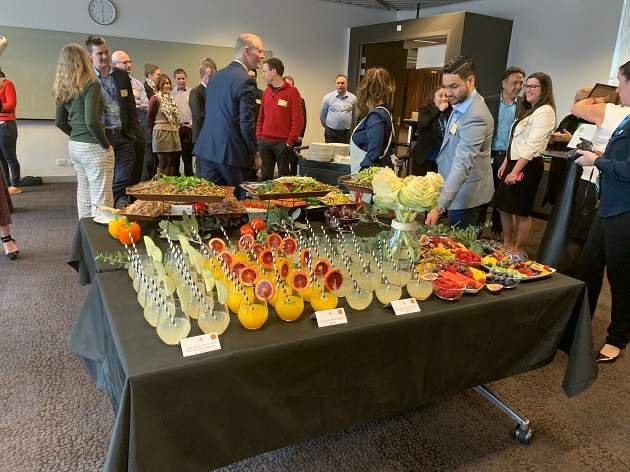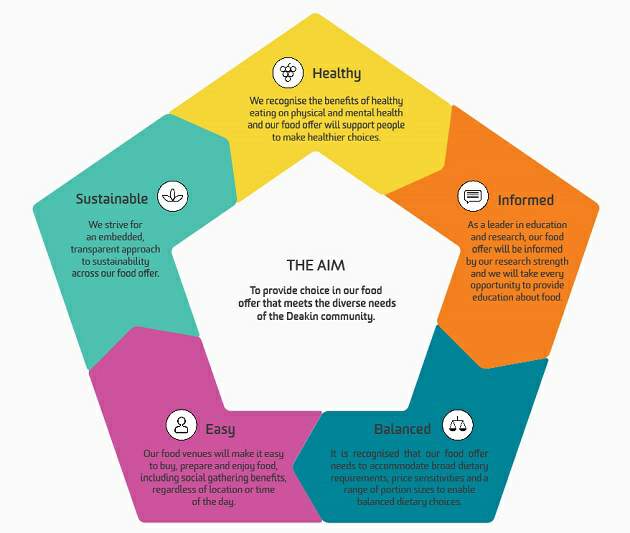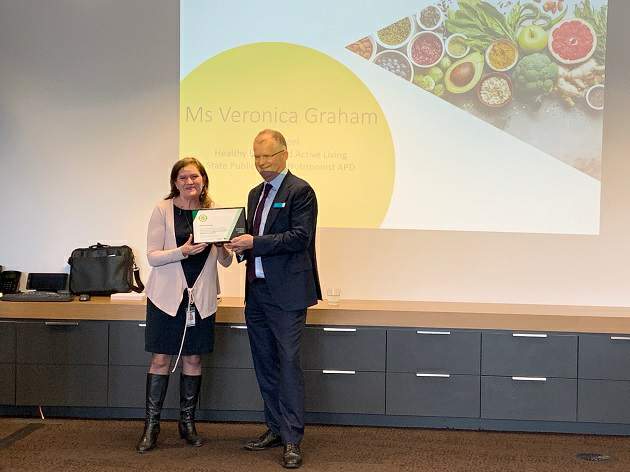 Healthy catering at the Deakin Food Charter event.
Healthy catering at the Deakin Food Charter event.
Deakin is dedicated to providing a healthier environment for staff, students and visitors. Through this journey, Deakin has successfully achieved four of the Achievement Program’s (AP) five health priority areas. The Healthy Workplaces Achievement Program supports workplaces to create healthy cultures and environments through best-practice benchmarks, practical steps and easy-to-use tools and resources. Deakin has already achieved Mental Health and Wellbeing, Alcohol, Physical activity and Smoking and the recent development and implementation of the Deakin Food Charter moves Deakin University a step closer to achieving the fifth and final AP priority area, Healthy Eating.
Promoting healthy eating in complex organisations such as universities can be challenging, due to the presence of multiple food sources including catering, vending and food retail. Deakin University participated in an Achievement Program pilot for complex organisations, designed to break down the healthy eating health priority area into food source environments, provide a community of practice between complex organisations and reflect and acknowledge incremental progress and achievement. Using the AP benchmarks and supported by the healthy Eating Advisory Service, Deakin have achieved some fantastic milestones and is now well on its way to achieving recognition for the Achievement Program’s Healthy Eating health priority area.
An important milestone has been the recent development and implementation of the Deakin Food Charter – a unique framework that guides and promotes a balanced, healthy and inclusive approach to food and food environments across all campuses.

Deakin University employed a Project Officer to support the roll-out of the Food Charter and sought expert nutrition advice from the Healthy Eating Advisory Service based on the Victorian Government’s Healthy Choices guidelines, The Healthy Choices guidelines use a traffic light system which highlights the nutritional value of foods and drinks: GREEN foods and drinks are the best choices, RED foods and drinks are options to be limited and AMBER are those to choose carefully which means students and staff now have access to a healthier offering of food in retail outlets and vending machines.
The Charter is based on five pillars – healthy, informed, balanced, easy and sustainable – focusing on everything from fresh, seasonal ingredients to reduced packaging or no minimum EFTPOS.
Within the first year of the Charter’s implementation, Deakin celebrated a 1.3 tonne reduction in sugar sold through the beverage vending sales. Currently, all 84 of Deakin University’s vending machines and four of its 15 retail outlets now meet the Healthy Choice Guidelines. “We’re proud of the steps we’ve taken towards enhancing the health and wellbeing of staff and students and the general Deakin community, through the introduction of a healthier food environment” said Chris Jones, Executive Director Campus Services Division.
Healthy Eating Advisory Service Program Manager, Margaret Rozman says Deakin University has provided a fantastic example by creating and supporting healthy changes on their campuses.
“We congratulate Deakin for showing strong leadership, and its commitment to providing its staff and students healthier options to choose from while on campus.” Ms Rozman said.
 Manager of Healthy Eating and Active Living Ms Veronica Graham presents Deakin University Vice-Chancellor Professor Iain Martin with certificate for Healthy Vending and Working Towards Healthy Food Retail
Manager of Healthy Eating and Active Living Ms Veronica Graham presents Deakin University Vice-Chancellor Professor Iain Martin with certificate for Healthy Vending and Working Towards Healthy Food Retail
Head of the Achievement Program Tope Adepoyibi commended Deakin for the changes they’ve made to create a supportive, healthier environment. “We’re urging more universities to follow in Deakin’s footsteps to provide healthier food choices across their campuses to meet the needs of students, staff and visitors.” Ms Adepoyibi said.
Deakin’s ongoing commitment to providing healthier environments is demonstrated through its new library food hub which enables 24/7 easy access to microwaves enabling students and staff to bring food from home and a healthy choice compliant vending machine. By providing these options, Deakin is making the healthy choice the easier choice for students while they study.
The University is also driving healthy eating messages and principles further by creating an opportunity for first year nutrition students to analyse the transformed food environments and support Deakin’s continuous improvement.
Beyond nutrition, the Deakin food Charter also commits to providing access to food which accommodates the cultural diversity of its community, considers environmental impact and takes into account the accessibility of clean and comfortable eating areas. This is demonstrated through a ban on plastic straws, promotion and availability of KeepCups and their use of organic food waste – all food products from food retail outlets are now diverted from landfill.
Deakin has placed a strong focus on communicating the changes to all staff and students and is committed to making a conscious effort to bring students and staff the latest in food research.
Underpinning the success of the Deakin Food Charter has been:
- Collaboration – A collaborative approach is essential. Deakin believes its success stemmed from comprehensive consultation and engagement with key stakeholders. For example, understanding the operational aspect of its food retailers and their business models as well as embracing the support and guidance from the Healthy Eating Advisory Service were crucial parts of the development and implementation of the Deakin Food Charter.
- Communication – Deakin emphasises the importance of communicating the changes to students and staff.
- Determination – While it’s important to stay committed to an end goal, Deakin encourages other organisations to stop and reflect on the progress and small changes they have made over time. Eventually these changes add up and have a positive effect on the broader community.